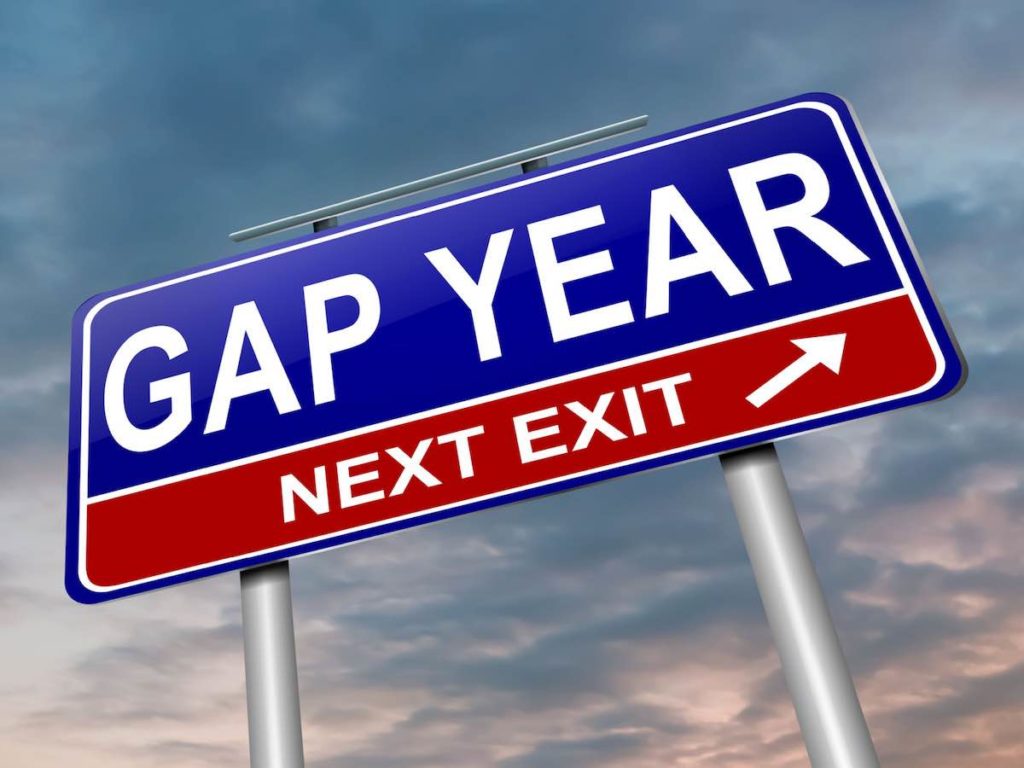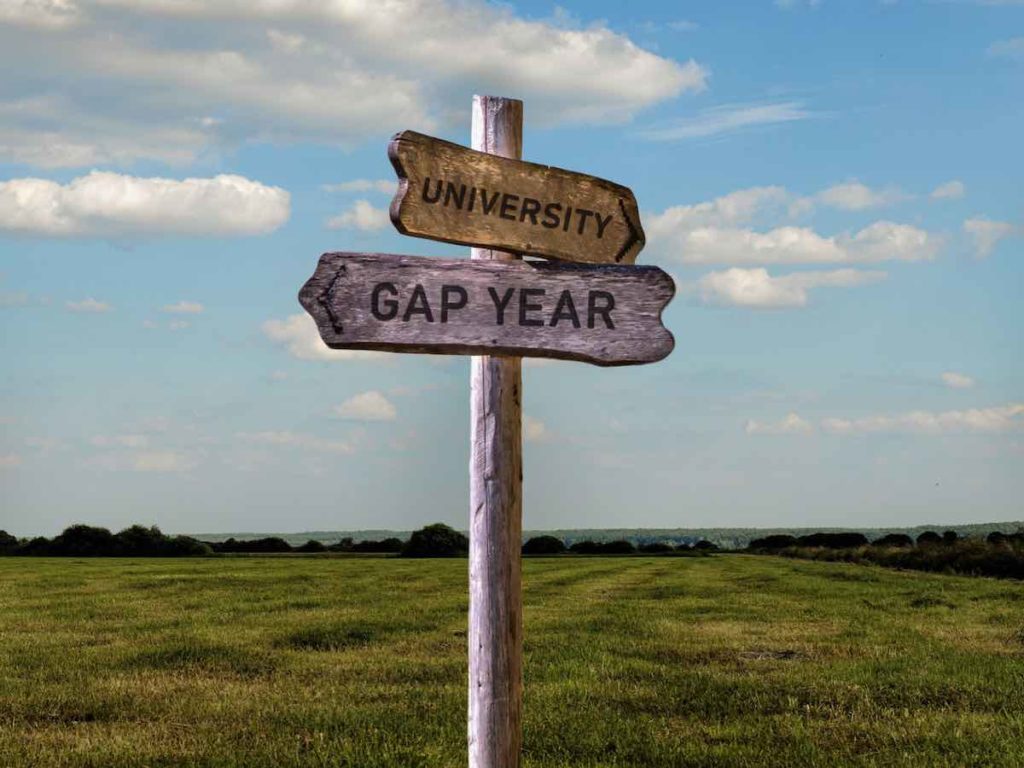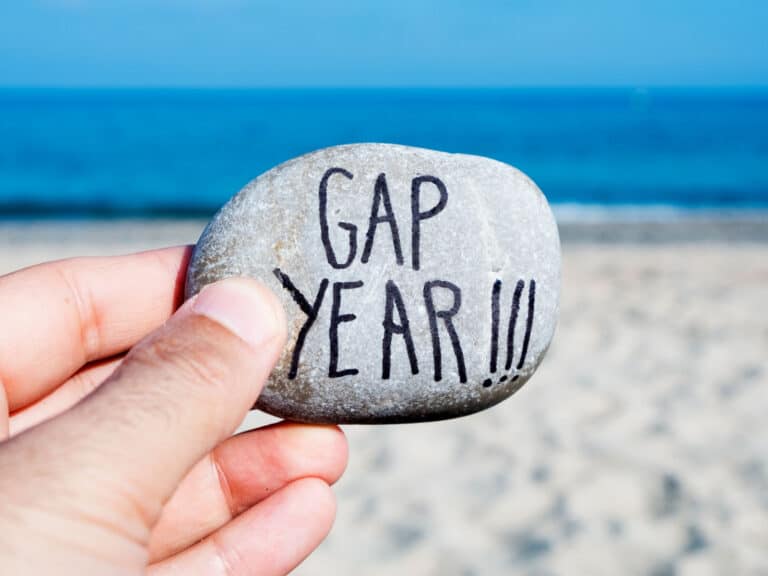How to Apply to College After a Gap Year
Taking an academic sabbatical just before college has become quite popular in last two years. As a matter of fact, according to recent surveys, up to 40% of college-bound teens are thinking about taking the time off!
Simply put, a gap year is a year (or less, but very rarely) spent away from regular studies, usually between graduation from high school and the beginning of one’s college life.
Many high school graduates are doing it, and many colleges and universities are recommending it.
There are various reasons why students take a gap year. But one thing remains true: after the year-long break is over, they will have to apply to college — with the exception of those who already applied and got admitted but instead decided to defer their admission for a year in order to engage in a gap year.
In this post, I will guide you through the steps in applying to college after your gap year. But before anything else, let’s talk about this matter that can keep you from pushing through with your gap year plan.

Avoid Procrastinating and Start Early
Embarking on a year-long learning outside of the classroom can be exciting. With the opportunity to pursue a passion in life, travel the world, participate in volunteering activities or work to get paid, taking a breather in order to be able to recharge and refocus and get to know oneself more seems something that most college-bound teens need.
But it can also cause stress and anxiety in some.
Thinking about taking a gap year alone may leave a student worrying about all kinds of things that have something to do with earning a college degree. Some of them include:
- Missing out on social activities only a college campus can bring
- Falling behind academically among classmates who are fresh from high school
- Losing the interest to enroll in college after a year to work on a program
But with enough preparation for taking a break from academics, you can minimize the worrying and at the same time maximize the focusing on the goals and objectives of having a timeout. It will also help to keep in mind that a gap year is actually recommended by many colleges and universities.
Some of the most prestigious ones that do so include:
- Georgia Institute of Technology
- Harvard University
- Harvey Mudd College
- Massachusetts Institute of Technology
- Princeton University
- University of North Carolina at Chapel Hill
- William & Mary
- Yale University
Plan College Based on Your Gap Year Experience
Some high school graduates take a gap year because they want to make sure that they are highly qualified and experienced for a particular degree program. Meanwhile, there are also those who wish to skip college for a year because they have no idea of what they want to study or the career path they wish to take in the future.
One of those who took a break because you wanted to learn more about yourself and, ultimately, determine what it is that you want in life exactly? Then consider your gap year experience when planning your college life.
It’s like applying to college as if you’re still in your junior or senior year of high school.
However, this time around, you have a much better picture of the future you, thus allowing you to pick the best possible school and opt for the best possible program. Admissions officers love the maturity and experience students who took a gap year have and can bring to the campus. And they also know that they are more likely to succeed academically.
So much so that gap year students in the US are said to graduate so much faster than the rest!
Build a Better College List This Time
Many high school graduates take a gap year for a wide variety of reasons. And if yours is that you were not accepted into your top-choice institution, then it’s of utmost importance that you build a better college list this time around.
It’s perfectly fine to still place your dream college at the top of your list.
However, it’s important to bear in mind that the chances of getting accepted to it on your second try are pretty low. This is true even if you have had a productive and meaningful gap year. That’s because some of the most important things that numerous colleges look for, such as high school GPA and class rank, have already been set.
So, in other words, there are things that can impact your admissions chances that a gap year cannot change. You will probably need to have an extraordinary gap year to strengthen your overall application. It could also mean that you will also have to make sure that you have a higher SAT or ACT score, which is something that we will discuss in a few.
And because of this, it’s a much better idea to build a college list that’s so much better than the previous year — one that’s more balanced and realistic, depending on your application’s quality.
Collect Transcripts From Your High School
Whether fresh from high school or in the middle of a much-deserved gap year or just came out of it, the entire college application process remains the same. And this means that you will have to submit your high school transcripts and related documents to the institutions on your college list.
The best time to secure your high school records and transcripts is before you take your gap year.
Schedule with your high school counselor so that you can discuss your plan to have a sabbatical from the academic world. He or she will round up and put all the necessary documents in a safe place so that they will be easily accessible to you when the moment comes you need to get your hands on them.
No matter if you are planning on applying to a college during your gap year or once you are through with it, having your high school records and transcripts ready can make the application process less stressful.
This is most especially true if you are planning on applying by means of early decision or early action.

Obtain Recommendation Letters
Besides your high school transcripts, letters of recommendation are other things that will complete your college application — it’s another way for admissions officers to get to know you beyond your GPA and test scores.
Make sure that you approach the right people who will pen your recommendation letters.
Because they are an important part of your application, it’s a must to see to it that your guidance counselor and teacher who will write your recommendations still know you and, more importantly, everything that’s good about you.
Just check out these recommendation letter facts:
- 15% of colleges say that the counselor recommendation has considerable importance
- 46% of colleges say that the counselor recommendation has moderate importance
- 11% of colleges say that the teacher recommendation has considerable importance
- 46% of colleges say that the teacher recommendation has moderate importance
The best time for anyone who is planning on taking a gap year to obtain letters of recommendation is while still in high school — it’s a great idea to get them at the same time as those who will go straight to college after graduation. This helps ensure that your achievements and potentials are still fresh on your counselor and teacher’s minds.
Consider a Recommendation From Your Gap Year
Fortunately for students who are on or have taken a gap year, there are other people who can write their letters of recommendation other than their former guidance counselors and teachers.
Participated in a gap year program offered by some colleges and universities?
Then there’s someone else whom you can approach to compose your recommendation letter: your gap year program leader. No one else can give college admissions officers a more vivid picture of your growth and development during a gap year than the individual who served as your mentor or coach while having some time away from the books.
Of course, the only way for you to get your hands on a gap year program leader recommendation is by partaking in a legit gap year program. Some institutions that offer it include:
- American University
- Florida State University
- Georgia Institute of Technology
- James Madison University
- Princeton University
- Tufts University
- University of North Carolina at Chapel Hill
- University of Oregon
- William & Mary
Typically, gap year programs are available for accepted students who wish to defer their admission for a year. But you may also use a recommendation letter from a gap year program leader should you decide to go to another college.
Spent your gap year either volunteering or working in order to earn real-world experience? Then you may ask your volunteer leader or employer to write a recommendation letter for you. He or she can provide valuable insight into your maturity, commitment and development.

Get Better SAT or ACT Scores
Technically speaking, both SAT and ACT scores do not have expiration dates. However, the vast majority of colleges and universities do not accept standardized test scores that are older than 5 years.
It’s very much likely for yours to be still valid after taking a gap year.
However, it’s not really a requirement that you use the SAT or ACT scores you obtained prior to having your gap year. So, in other words, especially if you are not particularly happy with what you have gotten, you may retake the SAT or ACT before you resume applying to colleges all over again.
Both the SAT and ACT are administered 7 times a year. If your gap year will involve traveling and being out of the country for a long time, consider retaking your standardized test before you fly. This allows you to take advantage of your still present structured study habit, which you might lose after a year, in order to get high SAT or ACT scores.
But if you are totally pleased with your standardized test scores and they’re not a part of the reason why you want to take a gap year, then there’s no need to retake the SAT or ACT — time and money saved!
Talk About Your Gap Year
It’s no secret that many colleges and universities allow and even encourage a gap year. However, you can rest assured that they will want to know the reason behind it. And if they like a student’s mission and objective for doing it as well as the growth and development resulting from it, a gap year won’t hurt admissions chances.
Besides the personal statement, an optional essay may also be used as a platform for discussing your gap year.
Naturally, you will want to talk about the experiences you have obtained and the changes and enrichments the academic timeout has brought upon your talents, skills and abilities. It goes without saying that you should also highlight in your optional essay all the unique and fascinating things resulting from the gap year that you can bring to the campus.
Just a quick tip when thinking about grabbing the opportunity to compose an additional letter to focus on your gap year: consider writing an outline and expanding as you go about your gap year.
Doing this can help assure that you won’t miss a thing, including small ones that can make a huge impact.
In addition, you can use an outline in making sure that you stay on track in order to meet your goals, thus allowing you to have the most productive and meaningful gap year possible.
Submit a Resume (Even If Optional)
Some colleges require applicants to submit resumes. There are also some schools within colleges where resumes are asked from hopefuls, such as Cornell University’s School of Hotel Administration, University of Rochester’s Eastman School of Music, and University of Michigan’s School of Music, Theater & Dance.
A resume, in some instances, is an optional application requirement.
Regardless of the case, it’s a wonderful idea to include in your resume the various experiences and accomplishments you have had from your gap year, serving as proof that you have used the time outside the campus wisely.
Refrain from assuming, however, that just because your resume says you took a gap year means that an acceptance letter is likely headed your way. It’s important to show the transferrable skills you acquired and honed or associate the entire experience with the school or program you are applying to.
In order to have a comprehensive and winning resume, remember to keep a document of everything you are doing while taking the time off so that you won’t miss anything that can wow admissions officers.
Agree to an Optional College Interview
It’s not just on your resume where you can demonstrate all the wonderful things a gap year has brought but also during an alumni or admissions officer interview, which many private colleges and universities offer optionally.
The odds of you getting asked to participate in one will depend on where you are applying.
At Harvard University, for instance, almost 20% of applicants are invited to go through an optional interview. And if you agree to it, your chances of gaining admission to the prestigious school are a little more than 60%.
At Stanford University and the Wharton School of the University of Pennsylvania, meanwhile, the odds are 48% and 43%, respectively.
Don’t be too shy to talk about your gap year in your college interview, especially if it has allowed you to learn more about yourself and what you want to do in the future.
Some of the things about your gap year you may consider discussing include:
- Your personal reasons for taking it
- Things you did throughout the year-long break
- Gained experiences relevant to the college or program
- Various accomplishments you have made
Above, we talked about including gap year-related matters on your resume. When agreeing to an interview by either an alumni or admissions officer, chances are that you will be asked to prepare a resume that you will have to send via email or bring to the venue, depending on whether it’s a virtual or in-person meeting.
Just Before You Start to Apply After Taking a Gap Year
It’s true that there are some downsides to taking a gap year. Some of them include being academically behind your peers, feeling alienated when it’s time to hit the books for you are a year older than most, additional planning when applying to colleges to potentially losing the urge to work on a degree.
However, there are many perks to enjoy, too. This is most especially true for those who are experiencing academic burnout and have very little to no idea which programs and careers they want to pursue.
Many things can be resolved by having a gap year, and many colleges and universities agree!
After the gap year is through, however, the reality that you will have to apply to a college will make itself known. But by keeping in mind the steps to take discussed above, you will find that the entire application process isn’t that too different if you were fresh from high school — although it will require some careful planning and strategizing, too.
Disclaimer: The views and opinions expressed in this article are those of the authors and do not necessarily represent those of the College Reality Check.
